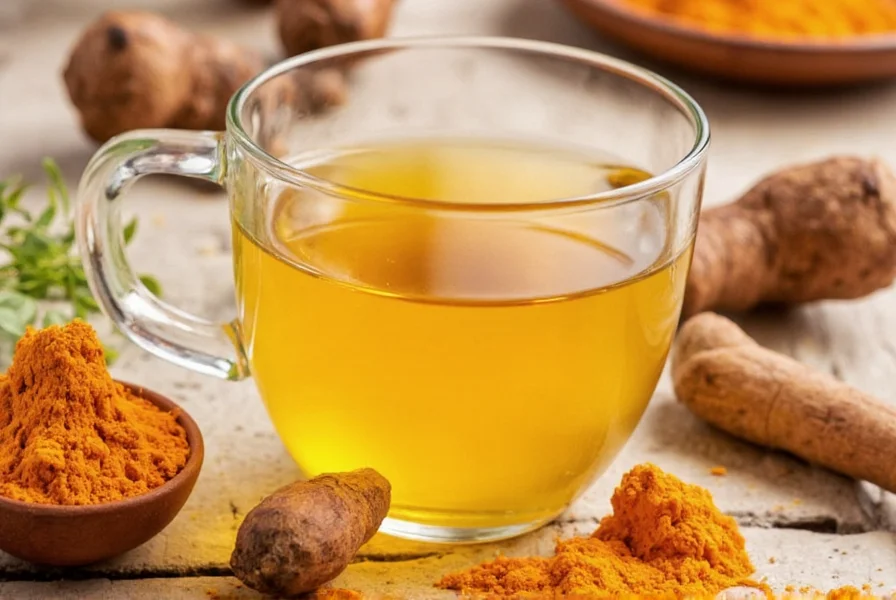Curcumin, the golden-yellow compound in turmeric, has been studied for its potential health benefits for decades. When brewed as tea, this ancient spice delivers its properties in a soothing, easily digestible form. Unlike supplements, turmeric tea provides a gentle way to incorporate curcumin into your daily routine while staying hydrated.
The Science Behind Turmeric Tea Benefits
Turmeric contains curcuminoids, with curcumin being the most active and researched component. While curcumin has limited bioavailability on its own, combining it with black pepper (which contains piperine) can increase absorption by up to 2,000%. Turmeric tea naturally lends itself to this enhancement, as many recipes include a pinch of black pepper.
When you steep turmeric in hot water, you extract water-soluble compounds that work synergistically with curcumin. The warmth of the tea may also improve circulation and support the body's natural inflammatory response pathways.
Evidence-Based Health Benefits of Turmeric Tea
Multiple studies have examined curcumin's effects on various health conditions. While research typically uses concentrated curcumin supplements, the regular consumption of turmeric tea may provide more modest but sustainable benefits.
| Benefit Category | Scientific Support | How Turmeric Tea Helps |
|---|---|---|
| Anti-inflammatory effects | Strong clinical evidence | May reduce markers of inflammation like CRP and interleukin-6 |
| Joint health | Moderate evidence | May decrease pain and stiffness in osteoarthritis |
| Antioxidant properties | Strong evidence | Neutralizes free radicals and boosts the body's antioxidant enzymes |
| Digestive support | Preliminary evidence | May stimulate bile production and reduce bloating |
How Turmeric Tea Supports Specific Health Concerns
Joint Pain and Arthritis Management
Research published in the Journal of Medicinal Food found that curcumin supplementation significantly reduced pain and improved function in people with osteoarthritis. While tea contains lower concentrations than supplements, regular consumption of turmeric tea for inflammation may provide cumulative benefits. Many users report reduced morning stiffness after incorporating turmeric tea into their daily routine for several weeks.
Digestive Health Benefits
Turmeric has traditionally been used to support digestion in Ayurvedic medicine. Modern research suggests curcumin may help regulate gut motility and reduce symptoms of indigestion. Drinking turmeric tea after meals could potentially ease bloating and support healthy digestion, making it a valuable addition to what conditions can turmeric tea help with digestive wellness.
Immune System Support
The antioxidant properties of curcumin help protect cells from damage while potentially modulating immune responses. During cold and flu season, many people turn to turmeric tea as a natural way to support their immune defenses. The combination of warmth, hydration, and bioactive compounds creates a soothing beverage that may help maintain immune balance.
Heart Health Considerations
Some studies indicate curcumin may improve endothelial function (the lining of blood vessels) and reduce markers associated with heart disease. While turmeric tea alone won't replace medical treatment, it may contribute to cardiovascular wellness as part of a heart-healthy lifestyle. Understanding how does turmeric tea help the body maintain vascular health is an active area of research.
Maximizing the Benefits of Your Turmeric Tea
To get the most from your turmeric tea, preparation matters. Here's how to optimize your brew:
- Add black pepper: Just 1/20th of a teaspoon significantly enhances curcumin absorption
- Include healthy fats: A small amount of coconut oil or ghee helps with curcumin solubility
- Use fresh turmeric root: Contains higher curcumin levels than powdered turmeric
- Brew properly: Simmer for 10-15 minutes to extract maximum compounds
- Consume regularly: Benefits accumulate with consistent daily use

Important Considerations and Safety
While turmeric tea offers potential health benefits, it's essential to understand its limitations and safety profile:
- Turmeric tea contains much less curcumin than therapeutic supplements
- Effects are generally subtle and build over time with regular consumption
- High doses may cause digestive upset in sensitive individuals
- Turmeric may interact with blood thinners and diabetes medications
- Pregnant women should consult their healthcare provider before regular use
People with gallbladder issues should exercise caution, as turmeric may stimulate bile production. If you're scheduled for surgery, discontinue turmeric tea at least two weeks beforehand due to potential blood-thinning effects.
Realistic Expectations for Turmeric Tea Benefits
It's crucial to maintain realistic expectations about what turmeric tea can and cannot do. While research on curcumin is promising, most studies use concentrated extracts rather than tea. Turmeric tea works best as part of an overall healthy lifestyle, not as a standalone treatment for medical conditions.
The benefits of turmeric tea for inflammation and other health concerns typically develop gradually with consistent use over weeks or months. Unlike pharmaceutical interventions, natural remedies like turmeric tea work with the body's systems rather than creating immediate dramatic changes.

Creating Your Perfect Turmeric Tea Blend
For those wondering how to make turmeric tea for maximum benefits, here's a simple yet effective recipe:
- Simmer 1-2 inches of fresh turmeric root (or 1 teaspoon powder) in 2 cups of water for 10-15 minutes
- Add a pinch of black pepper and optional ginger slices
- Strain and add a small amount of healthy fat like coconut oil
- Finish with lemon juice and a natural sweetener if desired
For enhanced anti-inflammatory effects, consider adding complementary ingredients like cinnamon or cardamom. Drinking turmeric tea in the morning may provide sustained benefits throughout the day, while evening consumption could support recovery during sleep.
Conclusion
Turmeric tea offers a gentle, accessible way to incorporate curcumin's potential health benefits into your daily routine. While it shouldn't replace medical treatment for serious conditions, regular consumption may support overall wellness, particularly for inflammation management, digestive health, and immune support. The key to experiencing what is turmeric tea good for lies in consistent, proper preparation, and realistic expectations about its effects as part of a balanced lifestyle.
Frequently Asked Questions
How often should I drink turmeric tea to see benefits?
For potential health benefits, most experts recommend drinking turmeric tea once or twice daily. Consistent daily consumption over several weeks is typically needed to notice effects, particularly for inflammation reduction. The optimal frequency depends on your specific health goals and tolerance.
Can turmeric tea help with arthritis pain?
Research suggests curcumin, the active compound in turmeric, may help reduce arthritis symptoms. A study in the Journal of Medicinal Food found curcumin supplementation significantly reduced pain and improved function in osteoarthritis patients. While tea contains lower concentrations than supplements, regular consumption of turmeric tea for joint pain may provide modest relief for some individuals.
When is the best time to drink turmeric tea?
The best time depends on your goals. Morning consumption may provide sustained anti-inflammatory benefits throughout the day, while evening tea could support recovery during sleep. Some people prefer drinking turmeric tea after meals to aid digestion. Avoid drinking it too close to bedtime if the warmth or spices affect your sleep.
Does turmeric tea interact with medications?
Yes, turmeric may interact with certain medications. It can enhance the effects of blood thinners like warfarin and may affect blood sugar medications. Turmeric might also interact with drugs metabolized by the liver. If you take prescription medications, particularly for blood clotting, diabetes, or acid reflux, consult your healthcare provider before regularly consuming turmeric tea.
How long does it take to feel the effects of turmeric tea?
Most people don't experience immediate effects from turmeric tea. For noticeable benefits related to inflammation or joint health, consistent daily consumption for 4-8 weeks is typically needed. Some may notice digestive improvements sooner, within a few days to a week. Individual responses vary based on metabolism, health status, and the specific condition being addressed.











 浙公网安备
33010002000092号
浙公网安备
33010002000092号 浙B2-20120091-4
浙B2-20120091-4